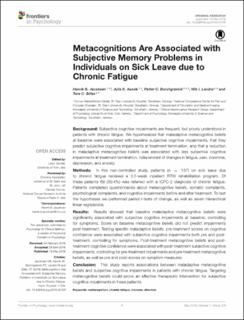| dc.contributor.author | Jacobsen, Henrik Børsting | |
| dc.contributor.author | Aasvik, Julie Kristine | |
| dc.contributor.author | Borchgrevink, Petter Chr. | |
| dc.contributor.author | Landrø, Nils Inge | |
| dc.contributor.author | Stiles, Tore Charles | |
| dc.date.accessioned | 2020-03-25T14:49:01Z | |
| dc.date.available | 2020-03-25T14:49:01Z | |
| dc.date.created | 2016-07-25T13:02:49Z | |
| dc.date.issued | 2016 | |
| dc.identifier.issn | 1664-1078 | |
| dc.identifier.uri | https://hdl.handle.net/11250/2648659 | |
| dc.description.abstract | Background: Subjective cognitive impairments are frequent, but poorly understood in patients with chronic fatigue. We hypothesized that maladaptive metacognitive beliefs at baseline were associated with baseline subjective cognitive impairments, that they predict subjective cognitive impairments at treatment termination, and that a reduction in maladaptive metacognitive beliefs was associated with less subjective cognitive impairments at treatment termination, independent of changes in fatigue, pain, insomnia, depression, and anxiety.
Methods: In this non-controlled study, patients (n = 137) on sick leave due to chronic fatigue received a 3.5-week inpatient RTW rehabilitation program. Of these patients 69 (50.4%) was referred with a ICPC-2 diagnosis of chronic fatigue. Patients completed questionnaires about metacognitive beliefs, somatic complaints, psychological complaints, and cognitive impairments before and after treatment. To test the hypotheses we performed paired t-tests of change, as well as seven hierarchical linear regressions.
Results: Results showed that baseline maladaptive metacognitive beliefs were significantly associated with subjective cognitive impairments at baseline, controlling for symptoms. Score on baseline metacognitive beliefs did not predict impairments post-treatment. Testing specific maladaptive beliefs, pre-treatment scores on cognitive confidence were associated with subjective cognitive impairments both pre and post-treatment, controlling for symptoms. Post-treatment metacognitive beliefs and post-treatment cognitive confidence were associated with post-treatment subjective cognitive impairments, controlling for pre-treatment impairments and pre-treatment metacognitive beliefs, as well as pre and post-scores on symptom measures.
Conclusion: This study reports associations between maladaptive metacognitive beliefs and subjective cognitive impairments in patients with chronic fatigue. Targeting metacognitive beliefs could prove an effective therapeutic intervention for subjective cognitive impairments in these patients. | en_US |
| dc.language.iso | eng | en_US |
| dc.publisher | Frontiers | en_US |
| dc.rights | Navngivelse 4.0 Internasjonal | * |
| dc.rights.uri | http://creativecommons.org/licenses/by/4.0/deed.no | * |
| dc.title | Metacognitions are associated with subjective memory problems in individuals on sick leave due to chronic fatigue | en_US |
| dc.type | Peer reviewed | en_US |
| dc.type | Journal article | en_US |
| dc.description.version | publishedVersion | en_US |
| dc.source.volume | 7 | en_US |
| dc.source.journal | Frontiers in Psychology | en_US |
| dc.source.issue | MAY | en_US |
| dc.identifier.doi | 10.3389/fpsyg.2016.00729 | |
| dc.identifier.cristin | 1369147 | |
| dc.description.localcode | © 2016 Jacobsen, Aasvik, Borchgrevink, Landrø and Stiles. This is an open-access article distributed under the terms of the Creative Commons Attribution License (CC BY). The use, distribution or reproduction in other forums is permitted, provided the original author(s) or licensor are credited and that the original publication in this journal is cited, in accordance with accepted academic practice. No use, distribution or reproduction is permitted which does not comply with these terms. | en_US |
| cristin.ispublished | true | |
| cristin.fulltext | original | |
| cristin.qualitycode | 2 | |

